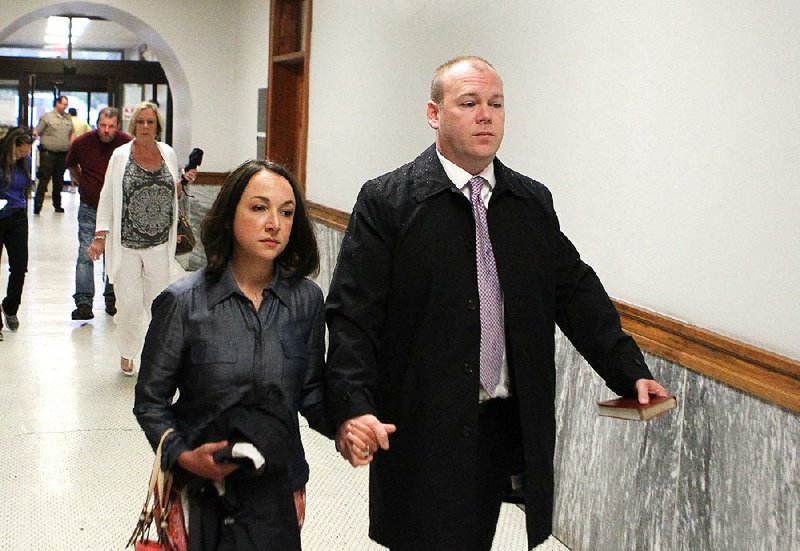HOT SPRINGS -- Attorneys in the negligent homicide case against a Garland County circuit judge whose 17-month-old son died last summer after being left in a hot car took nearly 10 hours Monday to whittle about 50 potential jurors down to a jury of 12 plus one alternate.
The final selection, reached about 5:45 p.m., comprises six women and six men. The selected alternate juror -- who will sit with the jury but will not be in the jury room when it comes time to render a verdict unless another juror is removed -- is a man.
Garland County Circuit Judge Wade Naramore, 36, was mostly stoic as he sat at the defense table throughout Monday's jury-selection process. At times, his face reddened and he tried to hide his tears by resting his forehead in his hands. He made frequent eye contact with potential jurors, but his face was mostly devoid of reaction to the jurors' answers.
He kept a small, brown, leather-bound book of devotions titled Jesus Calling directly in front of him. Throughout the day, he alternately laid his hands on the cover or traced a fingertip in a rhythmic pattern, back and forth, over and across.
Naramore's son, Thomas, died July 24, 2015, after the judge forgot to drop the toddler off at day care. He drove straight to the courthouse and left Thomas strapped in his car seat in the back seat of the vehicle for several hours. The high temperature that day was 101 degrees shortly before 5 p.m., according to National Weather Service records.
Negligent homicide is a Class A misdemeanor punishable by up to one year in jail and a $2,500 fine.
The proceedings began with special Circuit Judge John Langston calling all of the potential jurors into the courtroom gallery. Langston excused several after asking if they had any connections to Naramore, the attorneys or any witnesses in the case.
A handful attended church with Naramore. One had a connection through her daughter. Another was a fellow Rotarian. One man had interviewed with Naramore for a job.
Others knew law-enforcement witnesses or had professional connections to other witnesses.
Langston then turned the process over to a court clerk who pulled 18 names at random from a box.
A large percentage of the jury pool held master's degrees and above. Occupations included a construction worker, a school principal, a certified public accountant, a pilot, a pharmacist and a nanny with a master's degree.
Deputy prosecutor Thomas Young spent the next several hours peppering the potential jurors with questions.
"Do you know the difference between civil negligence and criminal negligence?"
"Can you have sympathy for him but still hold him accountable?"
"Have you already formed an opinion on the case?"
One potential juror was dismissed after she answered Young's question about whether she could remain impartial.
"Having done the same thing myself, probably not," she said quietly.
A man in a T-shirt with the sleeves cut off said he had sympathy for the family but didn't "think I'd ever do that. But I don't know."
He was later dismissed after saying he could not be impartial and had already made up his mind that Naramore was guilty.
A security guard at the church day care where Thomas Naramore attended said he could not be impartial because he "loves the kids" too much. He also said that Naramore's position as a judge gave him special treatment in the criminal justice system.
"If any of us did that, we'd already be in prison," he said.
Another man with two small children said his mind was already made up as to Naramore's guilt.
"It would be very, very difficult to change my mind," he said. "An innocent child lost his life."
During short breaks as the process continued, Naramore often reached for his wife, Ashley, who was sitting in the front row behind the defense table, hugging her as they both cried. At one point, the couple and some family members or friends huddled together in what looked like a silent prayer circle.
Ashley Naramore broke into subdued sobs when Young joked with a juror who was the father of young children about toys scattered in the living room.
She looked at her husband, who nodded at her reassuringly.
Numerous potential jurors expressed sympathy for Naramore.
"In my heart he is suffering more than this court could ever hurt him," said one male juror, who was later dismissed.
"Someone lost a child," a female juror said. "Regardless if he's guilty, he still lost a child."
Later Monday afternoon, defense attorney Patrick Benca told the jurors that he understood that "these types of things bring on some heavy emotions.
"It's OK to sympathize, we're all human," he said.
He asked the nanny if she could ever see a situation where she would forget a child in a car.
"I can see the circumstances, yes," she said.
She made the final cut as one of the 12 jurors.
Benca questioned a van driver who transports children about precautions she takes to ensure that no one is forgotten in the vehicle.
The teacher signs in the riders.
The driver checks them in again.
The parents sign them out.
When the vehicle is turned off, an alarm is activated that cannot be disabled without walking to the back of the bus, she said.
After questioning the jury pool, attorneys took less than 30 minutes to settle on the panel that will hear the case.
Langston warned jurors to not speak to anyone about the case and to avoid any related news stories.
"You will know more than any news media will ever know about this case," he said.
Opening arguments will begin at 9 a.m. today at the Garland County Courthouse.'
Metro on 08/16/2016
